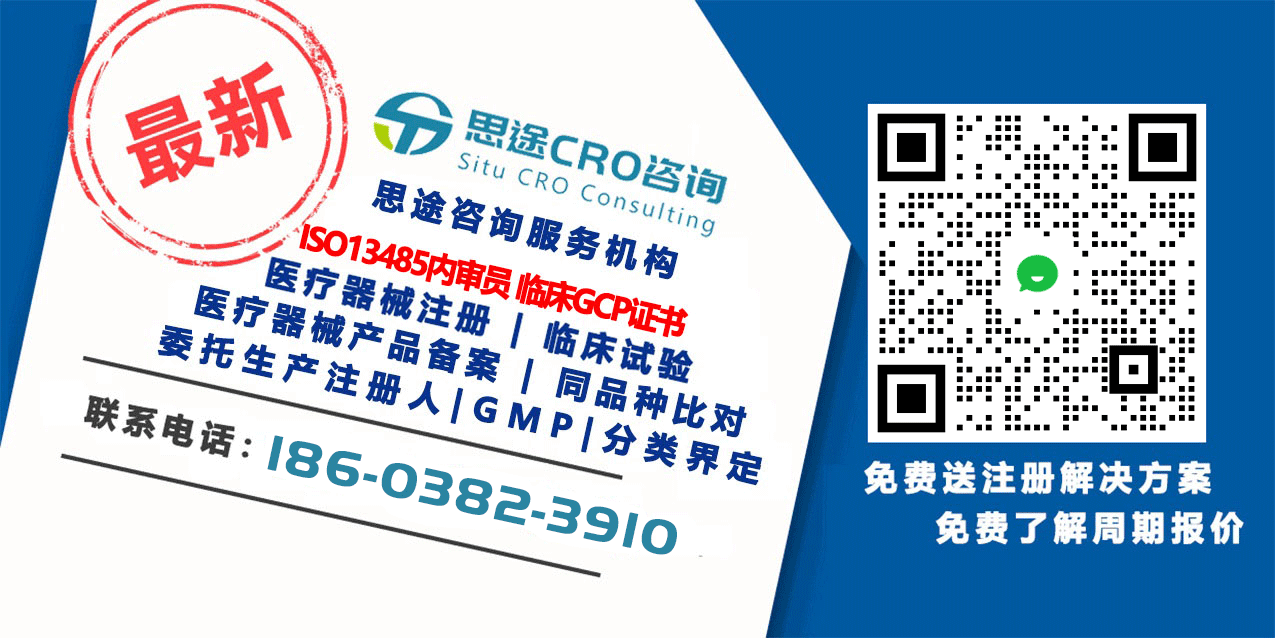单臂试验和安慰剂对照是什么意思?浅析受试者在临床试验中的获益及风险
NCCN(美国国立综合癌症网络)指南是目前国际上最权威、最广泛采用的癌症治疗指南。NCCN指南明确指出: 治疗选择之一就是参加临床试验 。 在欧美国家很多患者会主动咨询医生是否
来源:医疗器械注册代办 发布日期:2023-11-29 阅读量:次
在最近一次稽查中,有一个关于文盲受试者知情同意的讨论,挺有意思的,和大家分享一下。

受试者为文盲,不会写字,所以由其监护人签署了知情同意书,理由是根据中国GCP第二十三条(七)受试者或者其监护人,以及执行知情同意的研究者应当在知情同意书上分别签名并注明日期,如非受试者本人签署,应当注明关系。因为这里用的是“或者”,所以被稽查方认为如果受试者本人不能签署ICF,则由其监护人签署就可以了,注明关系即可,这符合中国GCP的要求。
听上去似乎很有道理,但其实是不正确的。中国是ICH成员,中国GCP大部分脱胎于ICH GCP,但是中国GCP在借鉴ICH GCP时有些信息遗漏,导致了理解的偏差。
ICH GCP关于受试者知情同意的要求是在4.8 Informed Consent of Trial Subjects中阐述的,其中4.8.1-4.8.4只提到了研究者或者受试者,均未涉及到监护人,承上启下的是4.8.5 The investigator, or a person designated by the investigator, should fully inform the subject or, if the subject is unable to provide informed consent, the subject's legally acceptable representative, of all pertinent aspects of the trial including the written information given approval/ favourable opinion by the IRB/IEC。在这里首次出现了“subject's legally acceptable representative”,直译是“法定代理人”,为了方便和中国GCP比较,下文中均用“监护人”指代。根据这一条款,只有在受试者没有能力完成知情同意时,监护人才适用。所谓“没有能力完成知情同意”是指没有能力在完全理解知情的内容后表达主观同意的受试者,如未成年人和严重痴呆的病人。而监护人是不适用于文盲受试者的知情同意的,因为文盲是有能力理解和表达同意的,只是无法阅读,不能由监护人代替文盲受试者完成知情同意过程。
同样,因为有了4.8.5的约定,ICH GCP条款4.8.6-4.8.15中涉及的“the subject's legally acceptable representative”均和4.8.5一样,仅适用于“没有能力完成知情同意的受试者”。如4.8.8 Prior to a subject’s participation in the trial, the written informed consent form should be signed and personally dated by the subject or by the subject's legally acceptable representative, and by the person who conducted the informed consent discussion。如果孤立地看这个条款,好像受试者或者监护人其中一人签署知情同意书就可以了,但联系上下文,我们就可以知道只有当受试者本人没有能力完成知情同意时(如未成年人),才可以由其监护人签署知情同意书。所以,监护人是不能代替文盲受试者签署知情同意书的,如果受试者是文盲,则需由见证人参与知情同意过程并签署知情同意书(具体规定参见ICH GCP4.8.9和中国GCP第二十三条(八))。
至于文首提到的中国GCP第二十三条(七)和ICH GCP4.8.8所要表达的是一个意思。所以,基于以上的分析,不能够依据中国GCP第二十三条(七),而让监护人代替文盲受试者来签署知情同意书。这不符合ICH GCP,也不符合中国GCP的主旨。
大家之所以对第二十三条(七)这一条款产生误解,主要是中国GCP在借鉴ICH GCP4.8.5时遗漏了监护人的适用场景。在中国GCP中,和ICH GCP4.8.5相对应的条款是第二十三条(四)“研究者或者指定研究人员应当充分告知受试者有关临床试验的所有相关事宜,包括书面信息和伦理委员会的同意意见”。与ICH GCP4.8.5相比,这里未提及监护人,也就未说明监护人的适用场景 “The investigator should fully inform the subject or, if the subject is unable to provide informed consent, the subject's legally acceptable representative”,以至于大家在理解后续条款(第二十三条(五)-(九))中的“监护人”会有误解或者困惑。直到第二十三条(十)才补充了监护人的适用场景:“受试者为无民事行为能力的,应当取得其监护人的书面知情同意;受试者为限制民事行为能力的人的,应当取得本人及其监护人的书面知情同意。”,但因为顺序倒置,导致大家在理解之前条款中的“监护人”时,未能考虑到其也只适用于无民事行为能力或者限制民事行为能力的受试者。
希望大家能够记住监护人在知情同意过程中的适用场景,也建议大家静下心来,好好读一下GCP。下一期和大家分享知情同意过程中见证人的使用,一个非常灰色的角色。
附:GCP中关于知情同意的条款。
中国GCP:第二十三条 研究者实施知情同意,应当遵守赫尔辛基宣言的伦理原则,并符合以下要求:
(一)研究者应当使用经伦理委员会同意的最新版的知情同意书和其他提供给受试者的信息。如有必要,临床试验过程中的受试者应当再次签署知情同意书。
(二)研究者获得可能影响受试者继续参加试验的新信息时,应当及时告知受试者或者其监护人,并作相应记录。
(三)研究人员不得采用强迫、利诱等不正当的方式影响受试者参加或者继续临床试验。
(四)研究者或者指定研究人员应当充分告知受试者有关临床试验的所有相关事宜,包括书面信息和伦理委员会的同意意见。
(五)知情同意书等提供给受试者的口头和书面资料均应当采用通俗易懂的语言和表达方式,使受试者或者其监护人、见证人易于理解。
(六)签署知情同意书之前,研究者或者指定研究人员应当给予受试者或者其监护人充分的时间和机会了解临床试验的详细情况,并详尽回答受试者或者其监护人提出的与临床试验相关的问题。
(七)受试者或者其监护人,以及执行知情同意的研究者应当在知情同意书上分别签名并注明日期,如非受试者本人签署,应当注明关系。
(八)若受试者或者其监护人缺乏阅读能力,应当有一位公正的见证人见证整个知情同意过程。研究者应当向受试者或者其监护人、见证人详细说明知情同意书和其他文字资料的内容。如受试者或者其监护人口头同意参加试验,在有能力情况下应当尽量签署知情同意书,见证人还应当在知情同意书上签字并注明日期,以证明受试者或者其监护人就知情同意书和其他文字资料得到了研究者准确地解释,并理解了相关内容,同意参加临床试验。
(九)受试者或者其监护人应当得到已签署姓名和日期的知情同意书原件或者副本和其他提供给受试者的书面资料,包括更新版知情同意书原件或者副本,和其他提供给受试者的书面资料的修订文本。
(十)受试者为无民事行为能力的,应当取得其监护人的书面知情同意;受试者为限制民事行为能力的人的,应当取得本人及其监护人的书面知情同意。当监护人代表受试者知情同意时,应当在受试者可理解的范围内告知受试者临床试验的相关信息,并尽量让受试者亲自签署知情同意书和注明日期。
(十一)紧急情况下,参加临床试验前不能获得受试者的知情同意时,其监护人可以代表受试者知情同意,若其监护人也不在场时,受试者的入选方式应当在试验方案以及其他文件中清楚表述,并获得伦理委员会的书面同意;同时应当尽快得到受试者或者其监护人可以继续参加临床试验的知情同意。
(十二)当受试者参加非治疗性临床试验,应当由受试者本人在知情同意书上签字同意和注明日期。
只有符合下列条件,非治疗临床试验可由监护人代表受试者知情同意:临床试验只能在无知情同意能力的受试者中实施;受试者的预期风险低;受试者健康的负面影响已减至最低,且法律法规不禁止该类临床试验的实施;该类受试者的入选已经得到伦理委员会审查同意。该类临床试验原则上只能在患有试验药物适用的疾病或者状况的患者中实施。在临床试验中应当严密观察受试者,若受试者出现过度痛苦或者不适的表现,应当让其退出试验,还应当给以必要的处置以保证受试者的安全。
(十三)病史记录中应当记录受试者知情同意的具体时间和人员。
(十四)儿童作为受试者,应当征得其监护人的知情同意并签署知情同意书。当儿童有能力做出同意参加临床试验的决定时,还应当征得其本人同意,如果儿童受试者本人不同意参加临床试验或者中途决定退出临床试验时,即使监护人已经同意参加或者愿意继续参加,也应当以儿童受试者本人的决定为准,除非在严重或者危及生命疾病的治疗性临床试验中,研究者、其监护人认为儿童受试者若不参加研究其生命会受到危害,这时其监护人的同意即可使患者继续参与研究。在临床试验过程中,儿童受试者达到了签署知情同意的条件,则需要由本人签署知情同意之后方可继续实施。
ICH GCP: 4.8 Informed Consent of Trial Subjects
4.8.1 In obtaining and documenting informed consent, the investigator should comply with the applicable regulatory requirement(s), and should adhere to GCP and to the ethical principles that have their origin in the Declaration of Helsinki. Prior to the beginning of the trial, the investigator should have the IRB/IEC's written approval/favourable opinion of the written informed consent form and any other written information to be provided to subjects.
4.8.2 The written informed consent form and any other written information to be provided to subjects should be revised whenever important new information becomes available that may be relevant to the subject’s consent. Any revised written informed consent form, and written information should receive the IRB/IEC's approval/favourable opinion in advance of use. The subject or the subject’s legally acceptable representative should be informed in a timely manner if new information becomes available that may be relevant to the subject’s willingness to continue participation in the trial. The communication of this information should be documented.
4.8.3 Neither the investigator, nor the trial staff, should coerce or unduly influence a subject to participate or to continue to participate in a trial.
4.8.4 None of the oral and written information concerning the trial, including the written informed consent form, should contain any language that causes the subject or the subject's legally acceptable representative to waive or to appear to waive any legal rights, or that releases or appears to release the investigator, the institution, the sponsor, or their agents from liability for negligence.
4.8.5 The investigator, or a person designated by the investigator, should fully inform the subject or, if the subject is unable to provide informed consent, the subject's legally acceptable representative, of all pertinent aspects of the trial including the written information given approval/ favourable opinion by the IRB/IEC.
4.8.6 The language used in the oral and written information about the trial, including the written informed consent form, should be as non-technical as practical and should be understandable to the subject or the subject's legally acceptable representative and the impartial witness, where applicable.
4.8.7 Before informed consent may be obtained, the investigator, or a person designated by the investigator, should provide the subject or the subject's legally acceptable representative ample time and opportunity to inquire about details of the trial and to decide whether or not to participate in the trial. All questions about the trial should be answered to the satisfaction of the subject or the subject's legally acceptable representative.
4.8.8 Prior to a subject’s participation in the trial, the written informed consent form should be signed and personally dated by the subject or by the subject's legally acceptable representative, and by the person who conducted the informed consent discussion.
4.8.9 If a subject is unable to read or if a legally acceptable representative is unable to read, an impartial witness should be present during the entire informed consent discussion. After the written informed consent form and any other written information to be provided to subjects, is read and explained to the subject or the subject’s legally acceptable representative, and after the subject or the subject’s legally acceptable representative has orally consented to the subject’s participation in the trial and, if capable of doing so, has signed and personally dated the informed consent form, the witness should sign and personally date the consent form. By signing the consent form, the witness attests that the information in the consent form and any other written information was accurately explained to, and apparently understood by, the subject or the subject's legally acceptable representative, and that informed consent was freely given by the subject or the subject’s legally acceptable representative.
4.8.10 Both the informed consent discussion and the written informed consent form and any other written information to be provided to subjects should include explanations of the following:
4.8.11 Prior to participation in the trial, the subject or the subject's legally acceptable representative should receive a copy of the signed and dated written informed consent form and any other written information provided to the subjects. During a subject’s participation in the trial, the subject or the subject’s legally acceptable representative should receive a copy of the signed and dated consent form updates and a copy of any amendments to the written information provided to subjects.
4.8.12 When a clinical trial (therapeutic or non-therapeutic) includes subjects who can only be enrolled in the trial with the consent of the subject’s legally acceptable representative (e.g., minors, or patients with severe dementia), the subject should be informed about the trial to the extent compatible with the subject’s understanding and, if capable, the subject should sign and personally date the written informed consent.
4.8.13 Except as described in 4.8.14, a non-therapeutic trial (i.e. a trial in which there is no anticipated direct clinical benefit to the subject), should be conducted in subjects who personally give consent and who sign and date the written informed consent form.
4.8.14 Non-therapeutic trials may be conducted in subjects with consent of a legally acceptable representative provided the following conditions are fulfilled:
(a) The objectives of the trial can not be met by means of a trial in subjects who can give informed consent personally.
(b) The foreseeable risks to the subjects are low.
(c) The negative impact on the subject’s well-being is minimized and low.
(d) The trial is not prohibited by law.
(e) The approval/favourable opinion of the IRB/IEC is expressly sought on the inclusion of such subjects, and the written approval/ favourable opinion covers this aspect.
Such trials, unless an exception is justified, should be conducted in patients having a disease or condition for which the investigational product is intended. Subjects in these trials should be particularly closely monitored and should be withdrawn if they appear to be unduly distressed.
4.8.15 In emergency situations, when prior consent of the subject is not possible, the consent of the subject's legally acceptable representative, if present, should be requested. When prior consent of the subject is not possible, and the subject’s legally acceptable representative is not available, enrolment of the subject should require measures described in the protocol and/or elsewhere, with documented approval/favourable opinion by the IRB/IEC, to protect the rights, safety and well-being of the subject and to ensure compliance with applicable regulatory requirements. The subject or the subject's legally acceptable representative should be informed about the trial as soon as possible and consent to continue and other consent as appropriate (see 4.8.10) should be requested.

站点声明
本网站所提供的信息仅供参考之用,并不代表本网赞同其观点,也不代表本网对其真实性负责。图片版权归原作者所有,如有侵权请联系我们,我们立刻删除。如有关于作品内容、版权或其它问题请于作品发表后的30日内与本站联系,本网将迅速给您回应并做相关处理。
思途医疗科技有限公司专注于医疗器械产品政策与法规规事务服务,提供产品注册备案申报代理、临床试验、体系建立辅导、分类界定、申请创新办理服务。

NCCN(美国国立综合癌症网络)指南是目前国际上最权威、最广泛采用的癌症治疗指南。NCCN指南明确指出: 治疗选择之一就是参加临床试验 。 在欧美国家很多患者会主动咨询医生是否

招募广告是临床试验中用以招募受试者的一种方法,随着药物、器械临床试验以及研究者发起的涉及人的生物医学研究越来越广泛地开展,临床试验中招募广告的使用也日益频繁,甚至

受试者招募定义: 招募合适的受试者进入临床试验。根据临床研究方案要求,通过招募潜在的符合方案入选标准不符合排除标准要求的受试者,并向研究者推荐,达到加快入组速度的目

作为一名苦逼的CRA,除了日常的监查工作以外,也许还有一个让人很头疼的问题,每次项目会议上PM重复又重复了的话题:“亲,这个Site的进度太慢啦,想想办法啊!CRA:我在想 我在想

大家在项目中,是否遇到过ICF更新的情况?在ICF更新后,已由受试者签署的知情同意书,是否需要重新签署呢?又有哪些情形不需要重新签署呢?本期我们继续跟大家分享知情同意书实

通过电话或面对面进行潜在受试者的预筛选,以确定受试者最初的合格性和其对研究的兴趣是招募过程中常见的策略。需要注意的是在使用此策略时,研究者必须保护潜在受试者的隐私

知情同意对从事临床的CRC来说,并不陌生。日常工作中每时每刻都在与临床试验受试者沟通交流,那么你知道知情同意书签署注意事项及核查要点吗?我们先来区分知情同意和知情同意

依从性(Patient compliance/Treatment compliance)也称顺从性、顺应性,指病人按医生规定进行治疗、与医嘱一致的行为,即病人依从治疗计划的程度,习惯称病人“合作”;反之则称为非依从

临床试验入组困难是临床试验从业者的普遍难题,如何更好的提高受试者招募效率?根据文献报道与笔者自身体会,我们罗列了以下主动提高受试者招募效率的方法,供各位参考:

知情同意,指受试者被告知可影响其做出参加临床试验决定的各方面情况后,确认同意自愿参加临床试验的过程。改过程应当以书面的、签署姓名和日期的知情同意书作为文件证明。对
六年
医疗器械服务经验
联系思途,免费获得专属《落地解决方案》及报价
咨询相关问题或咨询报价,可以直接与我们联系
思途CRO——医疗器械注册临床第三方平台